SSG Co-founder Yuill Herbert in Green Economy Heroes Podcast
In mid-July, SSG Co-founder and Principal Yuill Herbert was featured in the Green Economy Heroes Podcast with Dianne Saxe, an environmental lawyer and the former Environmental Commissioner of Ontario. They discussed SSG’s efforts to make climate action plans for cities across Canada, ranging from major cities like Toronto to Bridgewater, a town of 10,000 in Nova Scotia. They also delved into SSG’s history, why SSG is a worker co-operative, and how citizen engagement helps drive our climate planning work.
You can tune in wherever you get your podcasts, including Google Podcasts, Spotify, and Apple Podcasts. Or, if you’re in the mood for a read instead, check out the transcript of their conversation below.
—
Dianne: Hello. This is Dianne Saxe. Today on Green Economy Heroes, I’m chatting with Yuill Herbert, the last remaining founder and, he says, primary troublemaker of Sustainability Solutions Group in Toronto. Yuill, what is Sustainability Solutions Group?
Yuill: I’m very, very pleased to be here, first. So, Sustainability Solutions Group is our worker co-operative that a number of friends and I created in 2004. That’s when we officially incorporated. And we work with cities across Canada and increasingly beyond on climate action plans and sustainability plans.
Dianne: So you’re helping communities do what exactly?
Yuill: We’re helping them envision a future without fossil fuels. And we take them through a step-by-step process that involves engaging with different community groups, with citizens, with businesses, and also taking, or representing, the physical energy system of a particular community and showing exactly how that system can transition from what is essentially a fossil fuel-based system to a renewable energy system, and maximize efficiency gains in the process. And all of that is quantified at a high level of detail. And we  show what the financial implications are. And it becomes a roadmap for a community that they can implement year over year and track their progress against, so they can see how exactly in very detailed terms they can remove fossil fuels from the system.
show what the financial implications are. And it becomes a roadmap for a community that they can implement year over year and track their progress against, so they can see how exactly in very detailed terms they can remove fossil fuels from the system.
Dianne: Could you give us some examples of communities you’ve worked with and what the result has been?
Yuill: So we’ve worked with most of the major Canadian cities at this point, and many smaller communities as well, about 60 in total. Ranging from the Village of Queen Charlotte on Haida Gwaii, which is 600 people or so, to City of Toronto, which is 2.8 million—the largest municipality in Canada—to Sudbury and Thunder Bay to Halifax to the municipality of West Hants, Nova Scotia. So a very, very wide range of municipalities.
Dianne: And you’re one of the key authors of TransformTO. Is that right?
Yuill: Yeah. So TransformTO is a project that we worked [on] with the City of Toronto, a number of years ago, three or four years ago, and we worked through a very detailed model of every single building in the city, whether it’s a dwelling or an industrial or commercial building. We represented their energy consumption starting in 2011, and then identified a number of retrofits that would be required to reduce the energy consumption, the opportunities for renewable energy within the city, and essentially a detailed pathway to 80% GHG reductions by 2050. And then looked at the financial implications and the employment opportunities. And we’re actually just working with Toronto right now on an update to that with an even more ambitious strategy.
Dianne: And in general, do you find that these strategies will make communities—in addition to reducing their carbon footprints — do they have any other benefits?
Yuill: Yeah, and I think one of the exciting parts for us is when we started it was really about, we started working on all of these projects from the perspective of climate change. The very first project was actually Salt Salt Spring Island in British Columbia, one of the Gulf Islands. And they were interested in how they could use their official community plan to influence their greenhouse gas emissions footprint. But since, we’ve been able to apply the same lens to economic development strategies, to official community plans. And because energy is influenced by all the different activities that happen within a city, a climate plan and an energy plan is essentially a whole city plan. You need to understand all the infrastructure, the transit system, the building stock, how people move around. All of those dimensions are import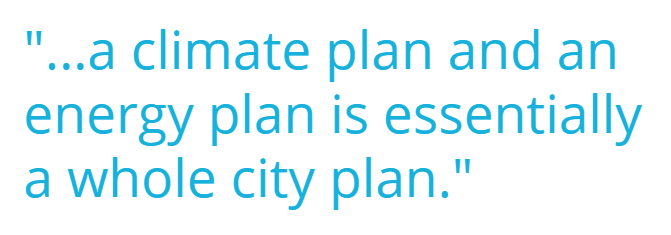 ant to understand to get to energy and emissions. And so it becomes a unifying city plan. And we’re starting to see some municipalities look at it through that lens, that their climate plan is their city plan. It’s no longer something that is confined to the Sustainability or Climate Department, and in some small corner of the municipality. But it’s really their overall agenda. So that’s a really exciting transition to see happening within this. It’s in a small number of municipalities, but certainly growing.
ant to understand to get to energy and emissions. And so it becomes a unifying city plan. And we’re starting to see some municipalities look at it through that lens, that their climate plan is their city plan. It’s no longer something that is confined to the Sustainability or Climate Department, and in some small corner of the municipality. But it’s really their overall agenda. So that’s a really exciting transition to see happening within this. It’s in a small number of municipalities, but certainly growing.
Dianne: And who is most ambitious about this transition?
Yuill: I think that, in some cases, it’s large cities, and there’s the municipalities that you’d expect like Vancouver and some of the smaller municipalities in British Columbia. District of North Cowichan comes to mind. But then there’s the unexpected municipalities. I think probably the most aggressive climate action plan in Canada right now is actually City of Edmonton‘s and followed closely by Town of Bridgewater, which is a little town in Nova Scotia, which has a very ambitious energy and emissions plan framed through the lens of economic development underway.
Dianne: Tell us more about Bridgewater. You know, you mentioned it to me before. First of all, most people won’t know anything about Bridgewater. It’s about 10,000 people. Is that right?
Yuill: Yeah, it’s an old industrial town on the southern shore of Nova Scotia, an hour-and-a-half south of Halifax. It has a declining population or flat population, aging population. It’s economically stressed. It has one major employer in town, which is a Michelin factory. And other than that, it’s a pretty quiet place on the social order of Nova Scotia. But it had a couple of staff, in particular one staff who envisioned or was passionate about energy and climate change. And he’d been developing an effort within the municipality to install some solar panels and do some retrofits on the buildings, and saw the opportunity that energy and emissions could be the main purpose of the municipality.
Dianne: So this is something that one person triggered?
Yuill: One person was the leader, but, as with any case, I think, that person is enabled by all sorts of people who are supportive or open minded around them. And that is very much the case within Bridgewater—definitely a remarkable bubble of ambition and thoughtfulness within the staff and the community.
Dianne: So what’s changed for Bridgewater as a result of your work with them?
Yuill: So Bridgewater has become a hip place to go. There’s a number of people who’ve moved there. It’s gained a brand, I think, that it never had before. It won, in a major competition with the federal government, it won a five million dollar prize through the [Smart Cities Challenge], which was a very high-profile prize and something that they would never have imagined that they’d win. When you think of the smart city prize, you think more of Waterloo or some tech place, so it’s remarkable that this backwater in Nova Scotia would win such a prize. And it was all based on their energy and emissions work, which we supported them in doing.
There’s also all sorts of other initiatives underway. A net-zero retrofit program, which is very ambitious and, really, municipalities from across Canada are watching it to see how it rolls out. Local improvement charge, which allows a broader range of dwellings and businesses to finance retrofits. They’re looking at really novel financing strategies to finance a lot of the transitions that we helped them identify, whether it’s community bonds or other measures. So there’s a real climate of innovation, as well as real projects underway on the ground in the community. A free transit system, which was free for a period at least, which really generated a lot of community support as well.
Dianne: And solar panels on town hall, I understand.
Yuill: Yeah. And that that was a direct project as a result of the person who’s been spearheading these efforts.
Dianne: So what’s been the response from the people in the community?
Yuill: So […] we were involved in an engagement process as part of the project that we worked on, and I think we, initially we overwhelmed people with data and information. So it takes a little while to build the literacy to be able—for people to see the potential and see what the opportunities are.
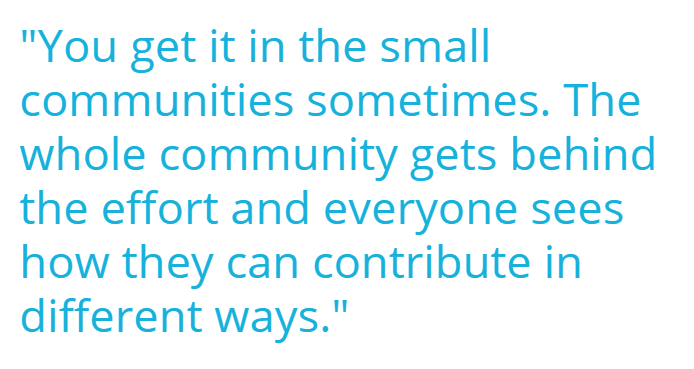
And Bridgewater has now a very high level of literacy on energy and climate change as a result of this project. So even your average person in the town will have, I think or at least I would argue, a much greater knowledge than most places in Canada. And generally, there is a committee of businesses who were engaged in the project and they were all very supportive. And this is—some of the businesses were restaurants, some of them were the local credit union. And they’re all quite engaged in different ways. The credit union set up a specific financing package to support retrofits within the community. So it’s really fascinating to see. You get it in the small communities sometimes. The whole community gets behind the effort and everyone sees how they can contribute in different ways.
Dianne: So you sound really excited about the work that you’re doing. Who else is excited about it?
Yuill: I would say that most of the municipalities that we work with are quite excited and see the potential of these arguments and I think that’s probably partly why we’re able to exist. Most of the municipalities and the staff that we work with are quite passionate, and we’re able to give them arguments and rationales and roadmaps that then they can use to advance their work within the community. And community members who are also passionate are able to use this work, and so I think all of those people are excited and enthusiastic. And even just being able to make what is an objective for many people in Canada more tangible and more real is, at least we found, is very helpful to all of those people’s efforts in moving forward.
Dianne: How do councils respond to the work that you do?
Yuill: So because we’ve been able to put a very strong economic lens on our work, most of the climate action plans that we’ve developed have been passed unanimously by councils. Not all, but I would say a high number or a high percentage of them have been. And it’s really hard to find a reason why you wouldn’t do it. I think that’s what it comes down to at the end. It improves health of communities. It provides economic opportunities. It provides new job opportunities, reduces greenhouse gas emissions, increases the brand of the community. It’s just a win-win-win paradigm, as far as we’re able to tell.
Dianne: Is that true, even if there is a very conservative component of council?
Yuill: I guess there’s different flavors of conservatism. And if it’s a conservatism that is a community order oriented, sort of caring community flavor, then we have found support. If it’s, a sort of right, ultra rightwing climate skeptical perspective, it can be a harder argument, although we haven’t always been unsuccessful with that group of people as well. But certainly we’ve encountered people who are just not willing to even listen, and in that case, it’s pretty hard to make, to gain any traction. But if there’s an opening and people are really concerned about their community, I think the case is, the case becomes pretty clear.
Dianne: So you mentioned North Cowichan. Where is North Cowichan and what’s it like and what happened there?
Yuill: North Cowichan was one of the earliest projects we worked on six years ago or so when we started working with municipalities. It is a town, or it’s actually a collection of, a rural community with three centers on Vancouver Island, the southern part of Vancouver Island. And it’s both very, very progressive and also very conservative. So it has both of those poles within the community and also at the time it had on the council as well. And so we worked on a climate action plan that was fairly ambitious and fairly detailed in many of the ways I’ve described, and there was very heated discussions at council. But because of the economic arguments and because of the future vision that we were able to paint, the plan did pass. And we’re actually working again five years later or six years later on an update with them right now, which is actually, again, more ambitious than we worked with, or than we undertook previously.
Dianne: And is, as a result of the work you did with North Cowichan, what kinds of changes did they make?
Yuill: So the work has permeated into all different aspects of their operations from a revolving loan fund to the way in which they’re making land-use decisions. So there’s certain developments that are challenged on the grounds of their climate impacts, based on their climate action plan. There’s, I think, considerations in their transportation investments, so what kind of transit system they have. They have a number of projects that they’ve been trying to move forward on, like a local improvement charge or PACE program, that haven’t yet materialized, but it’s an ongoing process.
Dianne: You mentioned that your organization is a co-op. Why are you a co-op? And what do you think are the advantages and disadvantages?
Yuill: So when we were starting, we were fresh out of university. It was four women and myself, and we were quite idealistic and trying to change the world for the better, as one would hope people at that age would do.
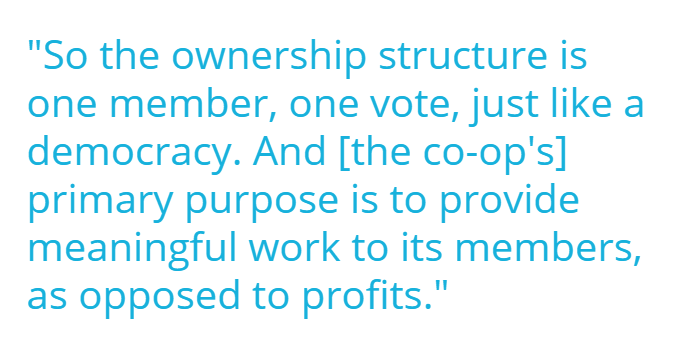
And we were looking for a business model that really aligned with our vision. And it was really hard to find that within the conventional sort of business structure, business environment within Canada, until we stumbled on the notion of worker co-ops. And worker co-ops are governed by the co-operative principles like any co-operative. And I think most Canadians are members of one or more co-operatives, whether it’s a credit union or Mountain Equipment Co-op or others. Workers co-ops are a flavor of that that are actually owned by the workers. So Mountain Equipment Co-op is owned by the members who shop there. A worker co-op is owned by the people who work at it. And the worker co-op movement in Canada is very small, but it’s very large in other countries in Europe and Latin America. And it’s a democratic organization. So people, the workers, say one person accumulates a lot of equity in the business, they don’t have any more say than any other members. So the ownership structure is governed according to one member, one vote, just like a democracy. And its primary purpose is to provide meaningful work to its members as opposed to profits. And so all of these characteristics of the co-op model really appealed to us. And also being part of a larger movement that wasn’t about maximizing profit, but was really about maximizing well-being, was very appealing. And it has a very long history in Canada, starting with the Antigonish movement in Cape Breton. So all of these factors made the worker co-op model very exciting for us.
Dianne: And how did it turn out in practice?
Yuill: I think it’s worked out really well. I think, at first, we didn’t tell any of our clients that we were a co-op. Now, we wear it as a badge of honor. And I think more and more people appreciate that and appreciate how that translates into the work that we do.
Dianne: How does it translate into the work that you do?
Yuill: So we’re not profit driven. Certainly, we try to make a profit and a profit is helpful for us. But our primary purpose is to do meaningful work. And for our members, it’s making a difference on climate change. And so that means that when we do a project, our first objective is to do a really good project and we’ll go out of our way to do that, even if it takes more time, we make less money, or it’s more complicated. We will do that because we want to do it and we’re not held back by a particular target for margin or whatever. So it gives us a lot more freedom than a company that’s owned by investors who are demanding a particular profit. They can’t do that. And a lot of our competitors are investor-owned companies. And so they don’t have the freedom that we have. And I think we can do much better, much more interesting projects as a result. And our track record shows that.
Dianne: Tell me about a client or project that really touched your heart.
Yuill: I think that the best examples of that are the unexpected stories and, like anyone, I have lots of preconceptions and notions that are quickly proven false when confronted by reality. But an example of this is when we work on a project in a community for which society has a particular idea, but it turns out to be completely false. And I think one example is Sudbury, which was, in the 60s, was an industrial wasteland. And the community then—I found out the details of the story later on—but it undertook this massive reforestation process to undo the contaminated land that resulted from the industrial activity within that community. So we started working in Sudbury with the idea that it was an industrial community that really wouldn’t be thinking about climate change in a serious way. And we quickly discovered that that wasn’t the case and that there was very passionate people of all walks of life within that community, including councilors, including staff from the municipality. And they were as ambitious and thoughtful as any other community, even more so than some progressive places that you would anticipate. So that was, it’s really fascinating to make those discoveries and to find remarkable people in every part of the country.
Dianne: Well, I think you told me that the small group got together a citizen’s petition for a climate emergency declaration, that this was transformative in your work there. Can you tell us a bit about that?
Yuill: Yeah. So when we [start working on a project], we’re often given a parameter. Our target is 80% by 2050, 80% reduction of GHG emissions by 2050, or 60%, or let’s build a pathway that reflects the reality of our particular context, which could be less ambitious. And that was the paradigm that we started working with in Sudbury. And then a small group of citizens started a petition for a climate emergency and it took off like wildfire. And thousands of people ended up signing this petition. And it just completely changed the level of ambition within the community overnight. And all of a sudden, we had to toss all of our assumptions and work out and go back to the drawing board with how do we get to net zero by 2050 or earlier based on this citizens’ movement. So that then changes the investments that the municipality will need to make and the community will need to make, it changes the whole trajectory and even just their vision of themselves. So that was a fascinating transition to see occur in real time within the community.
Dianne: So […] because I was involved at the time as well, as a result of this group of citizens getting together and working on this petition, Sudbury did adopt a climate emergency declaration and gave you much stronger instructions and adopted a much stronger plan and is implementing it now. Isn’t that right?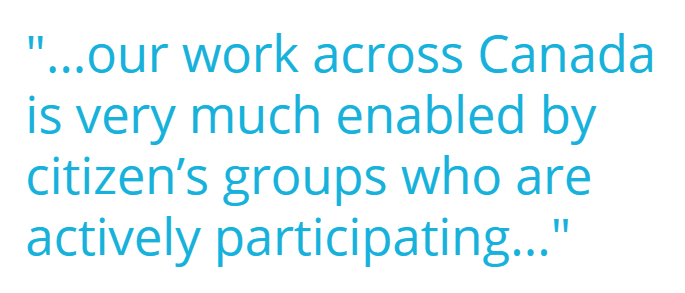
Yuill: That’s right.
Dianne: So it’s good for people to know that when they speak up, it can make a difference.
Yuill: Sure, yeah. So I think our work across Canada is very much enabled by citizen’s groups who are actively participating in their council and engaging with their council. And that is how we’re able to do what we do for the municipalities.
Dianne: How has your work changed in the 18 years since you started the business?
Yuill: When we started, there was no clear market for our work. We didn’t know how we were going to survive. And it’s evolved rapidly. I think now there’s a very clear imperative for work on climate change. In fact, it’s the highest priority in most municipalities. While they’ve curtailed work in other areas, we haven’t seen any evidence that work on climate has been or will be curtailed despite the impacts of the pandemic.
Dianne: Is there a common misconception about the green transition that you would like to debunk?
Yuill: I think what we’ve been able to demonstrate is that the green transition is a beneficial endeavor. There’s—I think there has been a sense that it would be a costly effort, that would be driven by a moral leadership. And I think what we’re able to show is that it’s actually a pragmatic transition that benefits all elements of society, depending on how it’s implemented. But it’s really a win-win situation. And I think that’s the story that has really resonated with a lot of councils and municipalities in Canada.
Dianne: What’s been your proudest moment so far?
Yuill: I think one of my proudest moments, or thoughts at least, is that we’ve been able to generate meaningful employment for 27 people or so between—we work very closely with another company—and between the two of us, the two enterprises, we have that number of employees, plus a large number of subcontractors as well. And I think it’s exciting that we’ve created a space and there is a space in Canadian society for people to think hard about how we can transition at the community scale to energy and emissions—to decarbonize communities.
Dianne: And what’s been the toughest moment and how did you manage?
Yuill: One of the toughest moments was when we decided that there was one member who was not working out, and we needed to transition that member out of the workers co-operative. That was a very tricky and prolonged and costly process. We involved an external facilitator and we had multiple day meetings and workshops, and we managed to come to a common understanding with that person, and she remains a friend today.
Dianne: Congratulations. That’s a tough thing to do. What’s your dream for your organization?
Yuill: My dream for our workers co-op is to mimic an organization that exists in Spain called Mondragon Group, which is a workers co-op with 100,000 employees—a much larger worker co-op. And it symbolizes what I think our economy could be if we thought more carefully about what it means to do work without being primarily motivated by profit.
Dianne: And what’s the next step in moving towards that?
Yuill: I think little by little. So I mentioned that we’re working with another business right now. I think in the near future at least, our big challenge is bringing those two enterprises together into one business. And so we’re currently working on that. And once we get to the other side of that effort, I think then we’ll keep exploring what our next steps look like and I can’t really say what they will be. Because I don’t know. Not because I’m being secretive.
Dianne: Yuill, what’s one big thing that you really wish you’d known when you started doing business?
Yuill: I think basic business capabilities, such as accounting and legal considerations in setting up a business, and what a contract looks like and how to write a contract. Just the basics of how you actually run a business. I studied philosophy and I missed out on all those considerations.
Dianne: They don’t teach you a lot about contracts in philosophy.
Yuill: Nope.
Dianne: Who are the three people who’ve been the most influential for you?
Yuill: So there is a lady named Professor Ann Dale. She contributed to setting up the National Roundtable on the Environment and the Economy in Canada, which was an influential group spearheaded by the federal government some years ago. She then shifted to become professor at Royal Roads. And in our early years, she really helped to keep us afloat and also provided inspiration. And she’s, well, I think she’s one of the leading thinkers on sustainable community development in Canada. Written some really fascinating books. So she’d be one person.
Another person who I’ve always been inspired by is Mark Spence. And he is a person who lives in New Brunswick, very grounded person. He solar panels his roof and [is] one of the first purchaser’s of an electric car and he just lives a very simple, thoughtful life. So he’s always been a major source of inspiration.
Dianne: A lot of people approach me wanting to find a way to be part of the green economy, whether as employees or as entrepreneurs. What advice would you give someone, whether a young person or any age, who really wants to be part of the green economy and can’t find a way in?
Yuill: I think the most important aspect is to discover and follow your passion because that is what will keep you going in the hard times. And there will be hard times. I think that’s pretty much guaranteed.
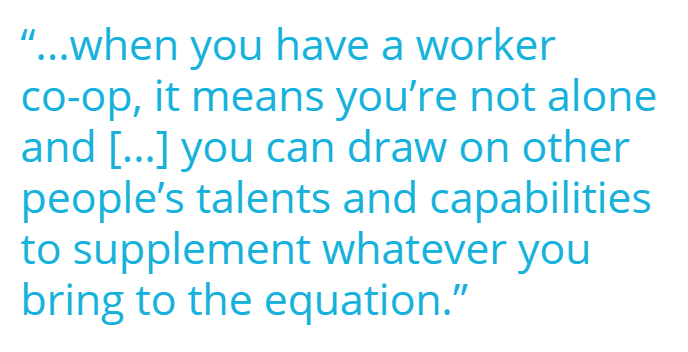
Surviving in this economy is challenging. Or any economy, really, is very challenging for any small business or any entrepreneur. And if you don’t have something like a passion to keep you going, it’s very easy to give up.
The other piece I think that has really been helpful for me is the worker co-op structure. Because when you have a worker co-op, it means you’re not alone and that means that you can draw on other people’s talents and capabilities to supplement whatever those are that you bring to the equation. And that also gives you a lot of resilience that you don’t have if you’re a solo entrepreneur or if you’re in a CEO-like environment where everyone’s looking to you. Those are two pieces that I think: build a team that is a support and follow your passion and don’t give up.
Dianne: Some of our listeners will be energized by hearing about the work you’ve been able to do in North Cowichan and other places across the country. If they want to see that same kind of municipal action where they live, what do you suggest they should do?
Yuill: The most important piece is to immediately talk to your council or mayor and engage at that level within the municipality. They have the ability to make these types of projects happen.
Dianne: And what should they ask? I mean, this is one thing that people often ask me. They don’t know what to say.
Yuill: So a very concrete step, immediately, is to develop a climate action plan or pass a climate emergency. And hundreds of municipalities in Canada have now passed climate emergencies and they typically come with a mandate to develop a plan in a very short order. And that’s a great way to join a growing coalition of people engaged in this issue.
Dianne: Yuill, where can our listeners find out more about the work that you do.
Yuill: So our website, ssg.coop. And then also by looking at climate action plans in many municipalities, whether it’s Saskatoon or Edmonton, Toronto, Halifax, many, many others. Our work will pop up in various forms and within the context of those municipalities.
Dianne: So S-S-G-dot-C-O-O-P.
Yuill: Yeah.
Dianne: OK. Well finally, Yuill, do you have hope?
Yuill: Certainly.
Dianne: Tell us why.
Yuill: I think it’s…I think my hope is about being alive and I don’t think there’s any rational justification for it. It’s just it’s…part of being human.
Dianne: All right, well, we’ll leave it there. Yuill Herbert, thank you very much for joining me today to talk about your work at the Sustainability Solutions Group. My name is Dianne Saxe. I’m a climate lawyer. You can find me at saxefacts.com. We’ll be back next week with another episode of The Green Economy Heroes. If you’re enjoying this podcast, please rate and review us and tell your friends to subscribe. Thanks very much and have a great day.


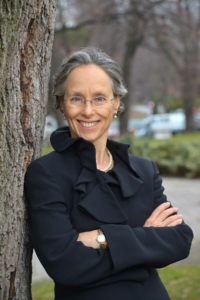
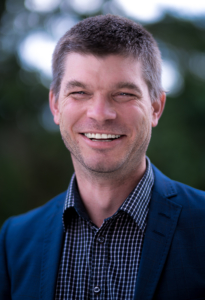

 Shannon Miedema
Shannon Miedema Photo by Dylan Ferreira on Unsplash.
Photo by Dylan Ferreira on Unsplash.